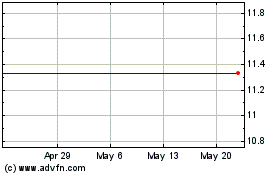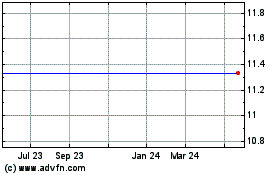3 Stocks to Win Amid Brazil's Slump - Analyst Blog
28 February 2014 - 1:42AM
Zacks
A sluggish economy and persistently high inflation have combined
to curb venture capital firms’ appetite in Brazil. The once-popular
investment hub for private equity and venture capital firms had to
lose out to other Latin American counterparts like Mexico, Colombia
and Peru as investors turned to more nascent markets for higher
return on investments.
From being the cynosure of the Latin American market with 79% of
the regional fundraising in 2011 and $8.1 billion capital raised
for investments in the country, Brazil has since slumped. The
tallies have declined to 65% and $3.6 billion in 2012 and further
to 42% and $2.3 billion in 2013, respectively.
After luring investors with a lucrative 7.5% GDP growth in 2010,
when the global economy was trying to emerge out of the financial
crisis, Brazil seems to have run out of steam as the primary growth
drivers of consumer spending and industrial production steadily
went on a downhill. According to the Brazilian central bank’s
IBC-Br index of economic activity, a preliminary indicator of GDP
growth, the economy shrank 0.2% in the fourth quarter of 2013. This
followed a contraction by the same magnitude in the preceding
quarter, probably entering into a technical recession.
The U.S. Federal Reserve’s decision to taper its monthly
bond-buying program to $65 billion might have also added to the
woes of this emerging economy. Approximately $12 billion has
reportedly been taken out of emerging stock markets so far this
year. The country that was once synonymous with the five major
emerging national economies in BRICS (Brazil, Russia, India, China
and South Africa) is now being associated with Fragile Five
(Turkey, Brazil, India, South Africa and Indonesia). This
highlights the risk of economies that have become overtly reliant
on skittish foreign investments to finance their growth
ambitions.
Despite this pessimism, Brazil still possesses some potential
stocks in this highly volatile equity market. Before we zero-in on
these profitable picks, let us take a stock of the current
situation.
The Rise of Private Equity and Venture Capital in
Brazil
At a time when the global economy was plagued by a financial
crisis, Brazil evolved as the darling of the investor community
with an expanding economy and a rising middle class population.
About 29 million people were estimated to be added to the Class C
segment of the economy between 2003 and 2009, which exceeded the
cumulative purchasing powers of Class A and Class B segments.
These increased consumption in various segments, ranging from
basic goods such as food products and healthcare to discretionary
goods such as personal care. With radical socio-economic
transformations and sustainable development initiatives, the
country attracted global investors to this burgeoning sector as
consumer spending accounted for over 60% of GDP.
Consequently, the private equity and venture capital industry in
Brazil boomed over the years and raised $4.8 billion of capital in
2009, up from $2.3 billion in 2005. The advent of private equity
transactions also benefited from a broader selection of investment
opportunities and lesser regulatory controls, making it one of the
easier places to park their money.
Brazil also had the advantage of being a consolidated democracy
and shared cultural affinities with the U.S. and Europe. A 2010
secondary offering worth R$120 billion by Petrobras
Argentina SA (PZE) further catapulted investor confidence
and transformed Brazilian stock exchange BM&F BOVESPA into the
then second largest stock exchange by market value.
The Ignominious Fall
As Brazil’s growth model primarily hinged on the export of basic
commodities and raw materials, the challenging global macroeconomic
environment dent a severe blow to its economy and the country
seemed to miss a backup plan to up the ante. GDP growth plummeted
from close to high mid-single digits to abysmally low in the later
half of 2013, contracting 0.2% in the fourth quarter. Consequently,
the country’s appetite for venture capital and private equity was
slowly on a wane.
On top of it, higher inflation dealt a knock-out blow, depressed
business and consumer confidence and swelled manufacturing costs. A
series of interest cuts by the central bank of the country since
April last year, to keep price rises at bay, has failed. Inflation
stood fairly high at 5.6% in Jan 2014, significantly higher than
the official target of 4.5%.
In addition, Brazil is slated to host the World Cup soccer in 2014
and the Summer Olympics in 2016. Although both the events are
likely to attract more revenues from advertising and tourism, it
requires a significant upfront investment from the country to build
the infrastructure facilities. Unless the events earn decent
revenues for the national exchequer, use of public funds for
populist extravaganza is sure to create a huge furor in the
country.
The Fed tapering further witnessed a high exodus of foreign
capital, as investors began to divert funds back to the U.S. in
search of higher returns. Undue reliance on overseas investments to
ward off large current account deficits and looming domestic
elections have jeopardized the sovereign rating of the country.
Credit rating agencies like Moody’s have warned of an additional
downgrade from its Baa2 rating.
3 Promising Brazilian Stocks
Despite the hoopla surrounding the country, the Brazilian equity
basket holds certain stocks that look attractive in terms of
valuation and sport solid Zacks Rank. Let’s take a closer look at
these companies that appear to be well positioned to benefit from
their solid sector dynamics.
Companhia de Saneamento Basico do Estado de Sao
Paulo (SBS): Headquartered in Sao Paulo, Brazil, this
Zacks Rank #1 (Strong Buy) stock offers basic and environmental
sanitation services in the region. The company also supplies
treated water to residential, commercial, industrial and municipal
customers and operates 214 water treatment stations and 502 sewage
treatment stations. This utility stock is currently trading at an
eye-catching forward P/E of 7.4x.
Ultrapar Holdings Inc. (UGP): Since its inception
in 1937, this Zacks Rank #2 (Buy) stock is engaged in the fuel
distribution and chemical businesses in Brazil. Headquartered in
Sao Paulo, Brazil, the company offers bulk liquefied petroleum gas,
diesel, gasoline, ethanol and natural gas. In addition, the company
also markets various chemicals such as ethylene oxide, ethylene
glycols, ethanolamines, glycol ethers, ethoxylates, solvents, fatty
acids from vegetable oils, fatty alcohols and specialty chemicals.
The company also operates in Mexico, Venezuela, Uruguay, and the
U.S. This basic materials stock is currently trading at a decent
forward P/E of 20.2x.
CPFL Energia S.A. (CPL): CPFL Energia offers
electricity in Brazil, generating energy through hydroelectric,
thermoelectric, sugarcane biomass, solar energy, and wind power
plants. The company distributes electricity to approximately 7.2
million consumers primarily in the states of São Paulo and Rio
Grande do Sul. Headquartered in Sao Paulo, Brazil, this Zacks Rank
#2 (Buy) stock is currently trading at an attractive forward P/E of
12.4x.
Don’t Miss These Golden Geese
As the country remains focused to stay afloat amid a deteriorating
macroeconomic scenario and uncertainty ahead of presidential
elections in October, this is probably the most opportune time to
own some high-potential Brazilian stocks with strong fundamentals
that pledge a healthy ROI.
CPFL ENERGI-ADR (CPL): Free Stock Analysis Report
PETROBRAS EGY (PZE): Get Free Report
SABESP -ADR (SBS): Free Stock Analysis Report
ULTRAPAR PA-ADR (UGP): Free Stock Analysis Report
To read this article on Zacks.com click here.
Zacks Investment Research
Petrobras Energia (NYSE:PZE)
Historical Stock Chart
From Feb 2025 to Mar 2025

Petrobras Energia (NYSE:PZE)
Historical Stock Chart
From Mar 2024 to Mar 2025
